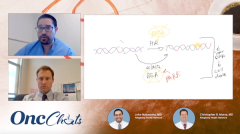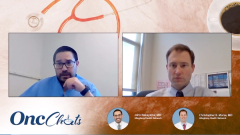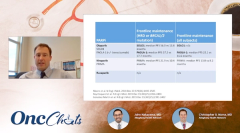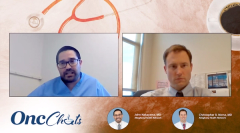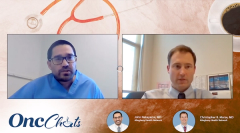
Taking Action to Individualize Ovarian Cancer Care: Counseling Those with BRCA Mutations
In this second episode of OncChats: Taking Action to Individualize Ovarian Cancer Care, John Nakayama, MD, and Christopher Morse, MD, discuss how to counsel patients with ovarian cancer whose tumors harbor BRCA mutations.
Episodes in this series

In this second episode of OncChats: Taking Action to Individualize Ovarian Cancer Care, John Nakayama, MD, of the Division of Gynecologic Oncology, Allegheny Health Network, and assistant professor of OBGYN at Drexel University, and Christopher B. Morse, MD, gynecologic oncologist, Allegheny Health Network, discuss how to counsel patients with ovarian cancer whose tumors harbor BRCA mutations.
Nakayama: Now, the other thing that some people talk about is [something] called synthetic lethality. You have a situation where you had BRCA, then you created another situation where you took out your backup, and all of a sudden, you do not have all your repair mechanisms, [and] the cell dies—hence, synthetic lethality. That is a pretty good synopsis of how that works in general, and Dr Morris is an expert in this.
Dr Morris, I would love to talk to you a little bit more about what this means in general for your patients. How do you counsel those patients [with BRCA mutations] when they come into your office?
Morse: That is an excellent question. As a gynecologic oncologist, not only [do we] treat patients who have [these] cancers, but we also see a lot of patients who get tested—either through cascade testing where another family member was diagnosed with a mutation and then they get tested, or just based on their family history—and are found to have a BRCA1 or BRCA2 mutation.
We see them when they are younger, and we will discuss with them what their lifetime risk of [diseases] like breast and ovarian cancer is. [We also discuss whether] there is anything that we can do to prevent their chance of ever developing one of these cancers.
If it is okay with you, I am going to share a slide that I made to outline some of the conversations that we have with these patients.
Nakayama: I think that's wonderful. I'm a visual learner, so I appreciate you bringing something up.
Morse: When we talk about patients who are at increased risk for breast and ovarian cancers, we focus a lot on BRCA1 and BRCA2 mutations; that is because they are the most prevalent mutations in [these diseases]. The lifetime risk of breast cancer is quite high, and this is over the entire lifetime of a patient. The risk of developing breast cancer is somewhere in [the range] of 60% to 70% for both BRCA1 and BRCA2. The risk of ovarian cancer is elevated, as well; it is roughly about 40% for BRCA1 carriers, and it is about 20% for BRCA2 carriers, so slightly different.
Really, the recommendations for patients who know that they have one of these mutations is to consider what is called a risk-reducing surgery, or a prophylactic surgery, to remove both the ovaries and the fallopian tubes at a certain age. This age does have some range to it. A lot of these conversations and decisions you are making with patients; [you are] making sure that they have completed their childbearing and that they are ready to proceed with this surgery.
For BRCA1, because these cancers tend to happen a little earlier than BRCA2-associated cancers, we recommend risk-reducing removal of the ovaries and fallopian tubes roughly at the age range of 35 years to 40 years. For BRCA2, it is [recommended that this happens] slightly later [on in their lives], around 40 years to 45 years, just because these patients tend to develop ovarian cancer at a later age compared with BRCA1 patients.
Current recommendations are for removal of the ovaries and fallopian tubes. As we know, a lot of these cancers start and originate in the fallopian tubes and not the ovaries. The role of hysterectomy is less clear, but most of the recommendations from the National Comprehensive Cancer Network [support the] consideration of removal of the ovaries and fallopian tubes.
Interestingly, we also know that for patients who do develop an ovary cancer or a fallopian tube cancer, when mutation carriers are compared with those who do not have a mutation, they also tend to have a better prognosis. For BRCA1, the 5-year overall survival [rate] is roughly 44% vs 36%, [respectively]; for BRCA2, it is even a little bit higher, at 52% vs 36%, [respectively]. The reason for that is thought to be that it is improvement in terms of response to the typical chemotherapy agents that we use, like carboplatin and paclitaxel. However, now that we have the introduction of PARP inhibitors, that is also pushing the envelope further for these patients.
Nakayama: There are two things that [you mentioned that] I thought were really important. Number one, I think that the lifetime risk in the average woman walking down the street, just to put it in perspective for people who are not gynecologic oncologists, is around 1.5% to 2%; these are extremely increased risks.
The other thing that Dr Morris said that is really important is [understanding] this prognosis difference. It is really interesting that in the cancer that you are less likely to get, the ovary cancer, has a better survival. I do not understand exactly why that is; I do not think there are data on that. However, I think it is really important [to note]. I mention this to my patients all the time. I feel kind of weird when I am talking to them; I kind of hope that they have a BRCA mutation, but I kind of hope they do not; I feel very torn about it, because that is what gave them this cancer. However, I am kind of hoping that they have the BRCA mutation because I know that they are going do better. It is this weird dichotomy that I find myself in. I do not know if you feel the same way.
Morse: Certainly, when you have a patient who already carries a diagnosis of ovary cancer, and you find out that they have either a germline or somatic mutation in BRCA1 or BRCA2, it helps you because it opens up the therapeutics that will really help to extend their survival.
Check back next Wednesday to view the next segment in this series.


